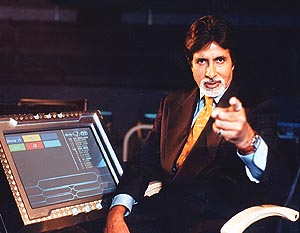Dear Bollywood Goddess,The short answer is, it means "to me." "Se" is a complex post-position, and depending on context, can mean "to," "with," or "from." I'll probably do a separate lesson exploring post-positions in greater detail. "Mujhse kaho" means "say to me," (kehna means "to say," and "kaho" is the imperative form), and it will generally take or imply a direct object. Mujhse kuch kaho -> Say something to me.
What is "mujhse," as in "mujhse kaho" in the title track "Main Hoon Na"?
Love,
Grub
Keep the questions flowin'!
And now for the number lesson. There is a 1988 song from the film Tezaab that will aid greatly in learning numbers 1-13. It is called "Ek Do Teen," and is one of the most famous Bollywood dance numbers of all time, starring the one and only Madhuri Dixit.
 Ek- One (pronounced like the English word "ache")
Ek- One (pronounced like the English word "ache")Do- Two (pronounced "though")
Teen- Three
Chaar- Four
Paanch- Five
Chhe- Six
Saat- Seven
Aath- Eight (pronounced Aaht)
Nau- Nine
Das- Ten (pronounced "thus")
Now for some "special" numbers.
Lakh- 100,000; according to the Indian numbering system, this is written as 1,00,000
Crore- 100 lakhs, or 10 million, written as 1,00,00,000
 In July 2000, Bollywood superstar Amitabh Bachchan (affectionately termed "The Big B") began hosting a show inspired by "Who Wants to be a Millionaire" titled "Kaun Banega Crorepati?"
In July 2000, Bollywood superstar Amitabh Bachchan (affectionately termed "The Big B") began hosting a show inspired by "Who Wants to be a Millionaire" titled "Kaun Banega Crorepati?"Kaun- Who
Banna- To become [Banega- will become]
Crorepati- Wealthy person [Pati literally means "husband," so someone married to ten million rupees]
Chalo then, until next time!
 Today's vocabulary lesson is inspired by a 2004 Bollywood blockbuster,
Today's vocabulary lesson is inspired by a 2004 Bollywood blockbuster,